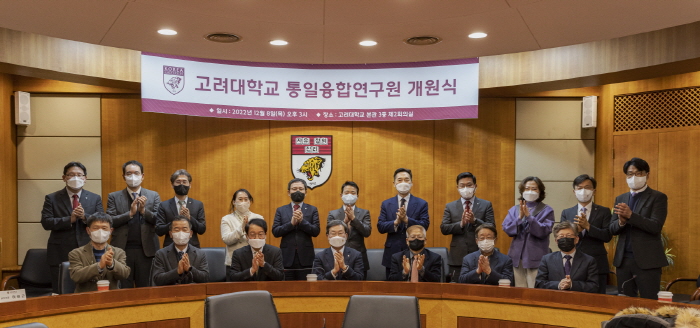Korea University Welcomes Opportunities For Multidisciplinary Convergence Research
Korea University will begin multidisciplinary convergence research to prepare for and study the unification of the Korean Peninsula, a long-cherished wish of the Korean people.
Korea University held an opening ceremony for the Institute for National Unification and Convergence on December 8 at 3:30 pm in the main building of Korea University.
Korea University has recently started multidisciplinary convergence research activities to address some of the pressing issues of society.
Earlier, on November 30, Korea University established the Institute on Aging to research and find solutions to health, social, institutional, and facility-environmental problems in Korea, which has entered a super-aged society. This research institute will combine the research capabilities in humanities and social sciences, engineering, and medicine that Korea University has accumulated to solve the problems facing Korean society.
Korea University has established the Institute for National Unification and Convergence as an organization directly under the KU President to prepare for and study the unification of the Korean Peninsula, a long-cherished wish of the Korean people. Based on the belief that research in all areas, including politics, economy, society, culture, and infrastructure, is necessary for the unification of the Korean Peninsula, Korea University has decided to lay the foundation for solving the long-cherished project of the nation by integrating the experiences and capabilities of Korea University.
Korea University plans to strengthen its next-generation unification research capabilities based on its experience of starting research on North Korea and unification for the first time in Korea in 1957. Then, Korea University established the Asiatic Research Institute Korea University, which was Korea’s first university-affiliated research institute, and developed it into a world-class comprehensive East Asian research institute. The fact that the university is operating seven centers—Center for Comparative History Studies, Center for Chinese Studies, Center for Taiwan Studies, Center for North Korean Studies, Center for Japanese Studies, ASEAN Center, and Sustainable Development Center—covering the entirety of East Asia means that it has the best environment for specializing in North Korean studies.
Currently, about 70 faculty members at Korea University are conducting research and education related to unification. Korea University has invited a total of 11 internal and external experts to form a promotion committee, taking into account their research fields and comprehensive achievements. Among the outside experts are KISTI Research Fellow Choi Hyeon-gyu, Industrial Bank Research Fellow Jung Yu-seok, and former Unification Ministry Director Lee Deok-haeng.
Under the goal of unification of the Korean Peninsula, the Promotion Committee designs research projects that can utilize Korea University’s excellent research capabilities in varied fields—the humanities, social sciences, natural sciences, engineering, health, medical care, culture, arts, and sports—and is working on establishing internal and external networks to carry out these research projects.
The Institute for National Unification and Convergence has selected four major research areas: science and technology and resource environment; health care; culture, arts, and sports; and humanities and social sciences. It plans to conduct multidisciplinary and consilient research in the four major areas to develop next-generation research capabilities and nurture the next generation of academics. In addition, the institute plans to receive orders for and carry out research projects for related ministries, hold seminars at home and abroad, promote cooperative projects, and operate a unification academy for citizens and university students.
The Institute for National Unification and Convergence is expected to build government-academic and industry-academic cooperation systems and overseas global networks for unification and convergence research, create an atmosphere for research on North Korea and unification on campus, establish a virtuous cycle of research and education, and return more research results to society. Furthermore, it can lay the groundwork for an outpost of a global unification network.
Nam Sung-Wook, a professor at the Graduate School of Public Administration at Korea University, was appointed as the first Director of the Institute for National Unification and Convergence. Director Nam said, “We will do our best to achieve the national task of unification by promoting academic convergence research related to unification, North Korea, and security in earnest, and continuing policy discussions through collaboration with major government agencies related to unification policy, such as the Ministry of Unification, Ministry of Foreign Affairs, Ministry of National Defense, and National Intelligence Service.”
At the opening ceremony, Korea University President Chung Jin-Taek said, “To respond head-on to the national situation regarding facing a super-aged society and the future of a unified Korea, Korea University has established the Institute on Aging and the Institute for National Unification and Convergence as affiliated research institutes directly under the president. Through the simultaneous launch of the two institutes, we will continue our efforts to present a clear vision and agenda for the future society of Korea. For the unification of the Korean Peninsula, Korea University, a university of the nation, will cooperate with government agencies and contribute to the long-cherished desire of the nation, the unification of South and North Korea, as well as to overcoming the heterogeneity caused by division using the academic theories and practical experience accumulated by Korea University. Based on Korea University’s long experience, we will focus on various integrated issues in each field of society to strengthen our next-generation unification research capabilities and open a new horizon for unification research through a convergent and multidisciplinary approach.”

